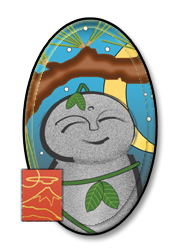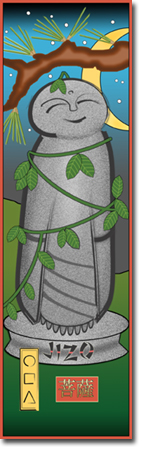On The Way: The Daily Zen Journal
Beyond Words
T'aego (1301-1382)
Our original teacher Buddha, the World Honored One, said to Ananda, “Even if you memorize the sutras of the tathagatas of the past, present, and future, this is not as good as one day’s cultivation of stainless learning.” Such true, frank words in this solid statement!
The wondrous truth handed down by all the Buddhas and ancestral teachers does not lie in written or spoken words. Nevertheless, out of great compassion, the enlightened ones had no choice but to use written and spoken words. The written and spoken words were specially directed toward medium and lower potentials, using these expedient means to directly indicate the mind-ground.
But in general, people studying Buddhism take these expedients as real and do not relinquish them. Isn’t this a great disease? They are like the prodigal son, who has left his father to go wandering, who sojourns in travelers’ inns which he falsely considers to be his own home. Not only has the prodigal son lost his home, but when will he ever find his way back? Alas, what a great pity for those who hold to the pointing finger as the moon.
But you are not like this now. You know for certain that the words of the Buddhas and ancestral teachers were all expedient means for indicating the mind-ground. You have made a clean break from your former studies of interpreting words. You should study the mind-ground: you must accomplish the great work in one life.
Then you can cut off birth and death and repay the fourfold benevolence (of parents, teachers, the ruler, and the donors.) The human mind-ground is very subtle and wondrous. It cannot be understood with words or grasped with thought or penetrated with silence.
Just keep this matter before you at all times, and above all do not let your attention to it dim. When you have naturally become one with the mind-ground, you reach the place where you know nothing, understand nothing.
Do not try to think what it is, just be completely alert and clear, and be able to continue this at all times whatever you are doing, whether moving or still, talking or silent. Once you get power, then there will be a good season. But you must not talk about this in front of people with no wisdom.
This is a life’s work for great people.
How to Study Zen
The days and months go by like lightning: we should value the time. We pass from birth to death in the time it takes to breathe in and breathe out: it’s hard to guarantee even a morning and an evening. Whether walking, standing, sitting, or lying down, do not waste even a minute of time. Become ever braver and bolder. Be like our original teacher Shakyamuni, who kept on progressing energetically.
When the mind-ground is equanimous and awake and still, you will have profound certainty in the intent of the Buddhas and ancestral teachers. You must accomplish this correctly. Mind is the natural Buddha: why bother seeking elsewhere? Put down your myriad concerns and wake up.

At the end of the road it’s like an iron wall. False thoughts are all extinguished, and extinguishing is wiped away: body and mind seem to be resting on the void. In the stillness, a light reaches everywhere with its brilliance.
The original face: who is it? As soon as it is mentioned, the arrow sinks in the stone. When the mass of doubt is shattered amidst all the particulars, one thing covers the sky of blue.
Do not talk of this with people without wisdom. Do not become overjoyed. You must visit Zen teachers: show them how your mind works and ask for their teaching. After that, you can be called one who continues the tradition of the ancestral teachers.
Our family style is not remote. When tired we stretch out our legs and sleep. When hungry we let our mouths eat. In the human realm, what school is this? Blows and shouts fall like raindrops.
T’aego (1301-1382)
Source – A Buddha from Korea – The Zen Teachings of T’aego trans by J.C. Cleary





Most of us are well aware that the truth cannot be experienced by just reading sacred writings, however, lest we swing into extremes, as we are sometimes known to do, they still have their purpose. From the very first line though, the encouragement to “stainless learning” means … what exactly?
There is a kind of reading and listening where we are actively engaged, not to judge, agree or disagree, react, but where we are fully present. Just to pause and realize you might not really know what is meant by any term or phrase causes us to stretch our boundaries.
And if we don’t know what “mind-ground” T’aego is talking about, perhaps it will spur us on to investigate. We can easily keep to his guidance to “Just keep this matter before you at all times, and above all do not let your attention to it dim.”
Attention and the ability to stay with a subject, question, or task is becoming more of a challenge in these times we find ourselves in. With a teacher or group to practice with we are brought back to our aspirations and principles effortlessly almost. Studying on our own, as many people do, leaves the task to us. And studying on your own must be one of the most difficult roads to travel.
What does it mean to live a life of practice when no one is there to set up a schedule of meditation or to bring questions to? No Dharma talks to attend, then what? Who will point out what we may be missing? Who will question our way of seeing things? … why WE will, of course. Easily said, but surely one of the biggest life koans many of us face.
“Let go: do not keep your knowledge
Why put gold dust in your eyes?
Do not stay with knowing and not knowing
Only then will you meet the good season.”
T’aego
Humbly offered,
Elana, Scribe for Daily Zen